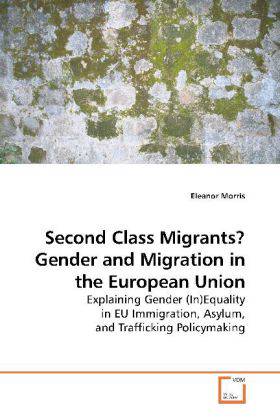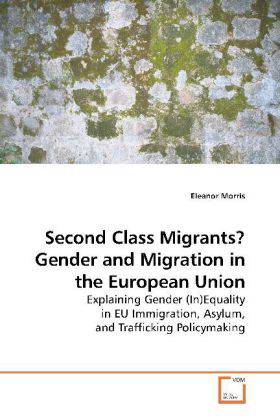
- Afhalen na 1 uur in een winkel met voorraad
- Gratis thuislevering in België vanaf € 30
- Ruim aanbod met 7 miljoen producten
- Afhalen na 1 uur in een winkel met voorraad
- Gratis thuislevering in België vanaf € 30
- Ruim aanbod met 7 miljoen producten
Zoeken
Second Class Migrants? Gender and Migration in the European Union
Explaining Gender (In)Equality in EU Immigration, Asylum, and Trafficking Policymaking
Eleanor Morris
Paperback | Engels
€ 48,45
+ 96 punten
Omschrijving
One of the European Union s most pressing policy challenges in the 21st century is that of migration. The EU finds itself in the position of balancing the political unpopularity of liberalizing migration policies against the exigencies of increasing numbers of migrants clamoring to gain entry. The interplay of political self-interest and humanitarianism has spawned a rich literature on EU migration policy. That literature, however, remains deficient in at least one area in its neglect of the gender- specific dimensions of migration. In order to explain the variation in the incorporation of gender that is evident in EU policymaking, this investigation tests the relative importance of five variables, many of which are customary in studies on this kind. However, the main finding of this study is that the variable that best explains why female migrants receive inconsistent consideration in EU policy development is the powerful perceptions that policymakers hold regarding women and their roles in the each of the areas of migration policy scrutinized in this analysis, including immigration, trafficking, and asylum policy.
Specificaties
Betrokkenen
- Auteur(s):
- Uitgeverij:
Inhoud
- Aantal bladzijden:
- 216
- Taal:
- Engels
Eigenschappen
- Productcode (EAN):
- 9783639160697
- Uitvoering:
- Paperback
- Afmetingen:
- 150 mm x 220 mm
- Gewicht:
- 303 g

Alleen bij Standaard Boekhandel
+ 96 punten op je klantenkaart van Standaard Boekhandel
Beoordelingen
We publiceren alleen reviews die voldoen aan de voorwaarden voor reviews. Bekijk onze voorwaarden voor reviews.











